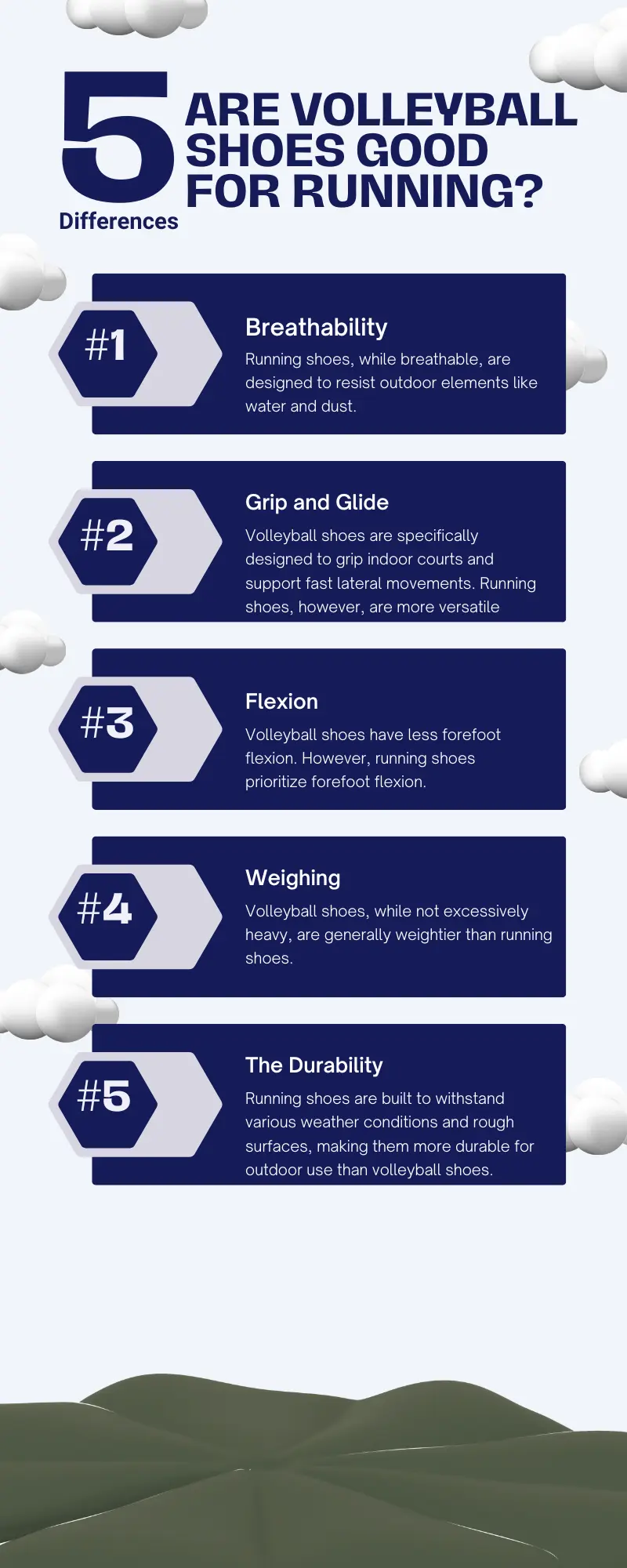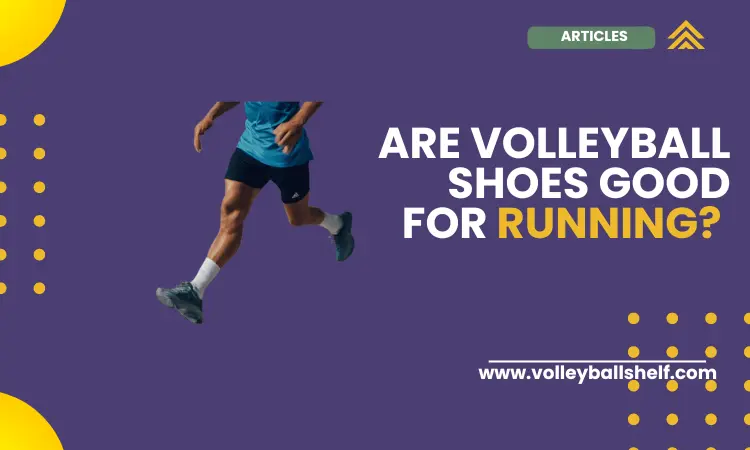Introduction
As 2023 beckons, many fitness enthusiasts are posed with the pressing question: “Are volleyball shoes good for running?” After all, a pair of shoes isn’t a trivial investment and when you’ve got a new pair of kicks, you want to take good care of them, and your money.
The answer to this inquiry isn’t quite as straightforward as a simple yes or no. This article aims to shed light on this dilemma, providing insights about volleyball shoes and running shoes, their major differences, and why using the former for running isn’t ideal.
Quick Response
While Volleyball Shoes excel in volleyball, they are not ideal for running. Running shoes provide the necessary cushioning and support for forward motion, which differs from the side-to-side movements in volleyball. Using volleyball shoes for running may lead to discomfort or injury, so it’s best to choose the right footwear designed for each activity to ensure performance and safety.
Volleyball Shoes Vs Running Shoes: Key Differences

1. “Airy Interior: The Breathability Factor”
First off, the breathability of a shoe is paramount. Volleyball shoes are generally designed with mesh uppers which allows for excellent ventilation, reducing perspiration and the chances of sweaty, smellier feet.
This design also aids in keeping the feet cool during high impact movements and quick changes in direction – both of which are common in volleyball games. Conversely, running shoes, while breathable, are designed to resist outdoor elements like water and dust, thus may not provide the same level of ventilation.
2. “Grip and Glide: Examining Outsole Design and Traction”
Next, we delve into the outsole design. Volleyball shoes are specifically designed to grip indoor courts and support fast lateral movements. The gum rubber outsoles are key for providing this traction.
Running shoes, however, are more versatile. Their outsoles, usually made of durable carbon rubber, are designed for various surfaces – road, footpath, and even trails or cross-country. The traction in running shoes is designed for forward motion rather than change of direction.
3. “Flexion Freedom: The Forefoot Flexibility”
Forefoot flexion is another aspect where these shoes differ. Volleyball shoes have less forefoot flexion as they are made to support sudden stops and changes in direction.
However, running shoes prioritize forefoot flexion as it helps in maintaining a steady stride and optimizes the forward running performance.
4. “Weighing It Out: The Weight”
Weight is another major factor. Volleyball shoes, while not excessively heavy, are generally weightier than running shoes. The extra weight provides stability during rapid, multi-directional movements.
On the other hand, running shoes are designed to be lightweight for comfort during long-distance running.
5. “Resilience to Roughness: The Durability”
Lastly, the durability of these shoes comes under consideration. Volleyball shoes are designed for indoor use and may not be as robust when it comes to outdoor durability. Running shoes are built to withstand various weather conditions and rough surfaces, making them more durable for outdoor use.
Why Running in Volleyball Shoes Isn’t Optimal
Wearing volleyball shoes for running might not lead to an optimal performance. The cushioning systems in running shoes are designed to absorb the high impact from running, something volleyball shoes may not provide. This could lead to discomfort and potentially increase the risk of injury.
Moreover, taking your volleyball shoes outdoors for a run could wreck them faster. The outsoles may wear off quickly, the shoes could become uncomfortable, and their grip could reduce significantly.
Can Volleyball Shoes Double as Gym Shoes?
The question now arises, if volleyball shoes aren’t great for running, could they be useful for other activities? Specifically, could they be used in the gym for workouts such as lifting, squats, and deadlifts?
The answer here is, it depends. While not ideal, you might be able to use volleyball shoes for general fitness activities. However, remember that these shoes are designed for volleyball – for high impact and quick direction changes on indoor courts.
They are not designed for the kind of heavy lifting and stability required for gym workouts. It’s always better to get specialized shoes for each activity to ensure optimal performance and safety.
Are Volleyball Shoes Good for Running? Final Thoughts
While hybrids exist, such as basketball and volleyball shoes that could potentially offer more versatility, it’s important to note that shoes are designed with a specific purpose in mind.
At the end of the day, volleyball shoes are made for volleyball and running shoes for running. Although it might seem cost-effective to use one pair for multiple activities, it could end up costing more in terms of injury, discomfort, and replacing worn-out shoes. Invest wisely in your footwear. Shoes, after all, are the foundation of your workout or sport.
They can optimize your performance, prevent injuries, and make the activity enjoyable. Remember, your feet deserve to be taken good care of, so choose wisely. We hope you found this article useful, and next time you’re posed with the question, “Are volleyball shoes good for running?”, you’ll know exactly what to say



![What Volleyball Shoes Make You Taller? [Top 5 Picks]](https://volleyballshelf.com/wp-content/uploads/2023/09/What-Volleyball-Shoes-Make-You-Taller.webp)
![How to make your volleyball shoes grip better? [3 Tips]](https://volleyballshelf.com/wp-content/uploads/2023/08/how-to-make-your-volleyball-shoes-grip-better.webp)
![Can you use basketball shoes for Volleyball? [3 key Differences]](https://volleyballshelf.com/wp-content/uploads/2023/09/can-you-use-basketball-shoes-for-volleyball.webp)
![Do Asics Volleyball Shoes Run Small? [5 Reasons]](https://volleyballshelf.com/wp-content/uploads/2023/09/Do-Asics-Volleyball-Shoes-Run-Small.webp)
![When to get new volleyball shoes? [3 key signs]](https://volleyballshelf.com/wp-content/uploads/2023/09/When-to-get-new-volleyball-shoes.webp)
![Can You Wear Tennis Shoes for Volleyball? [ 4 Core Differences]](https://volleyballshelf.com/wp-content/uploads/2023/08/www.reallygreatsite.com-4-1.webp)